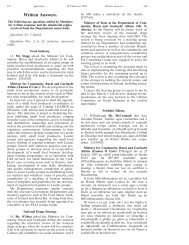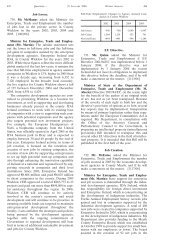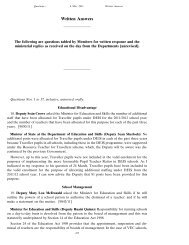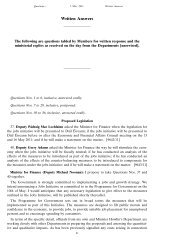Written Answers. - Parliamentary Debates - Houses of the Oireachtas
Written Answers. - Parliamentary Debates - Houses of the Oireachtas
Written Answers. - Parliamentary Debates - Houses of the Oireachtas
You also want an ePaper? Increase the reach of your titles
YUMPU automatically turns print PDFs into web optimized ePapers that Google loves.
Questions— 14 February 2012. <strong>Written</strong> <strong>Answers</strong><br />
Under <strong>the</strong> legislation, an owner <strong>of</strong> a residential property on <strong>the</strong> liability date <strong>of</strong> 1 January 2012<br />
is liable to pay <strong>the</strong> household charge by 31 March 2012, unless o<strong>the</strong>rwise exempted or entitled<br />
to claim a waiver. Revenues from <strong>the</strong> household charge will support <strong>the</strong> provision <strong>of</strong> local<br />
services. Internationally, local services are administered by local authorities and financed by<br />
local service charges. In Ireland, local authorities are responsible for, among o<strong>the</strong>r services,<br />
public parks; libraries; open spaces and leisure amenities; planning and development; fire and<br />
emergency services; maintenance and cleaning <strong>of</strong> streets and street lighting. These facilities<br />
benefit everyone.<br />
431. Deputy Clare Daly asked <strong>the</strong> Minister for <strong>the</strong> Environment, Community and Local<br />
Government <strong>the</strong> reason <strong>the</strong> household tax database was not put out to tender in accordance<br />
with departmental procedures. [7840/12]<br />
Minister for <strong>the</strong> Environment, Community and Local Government (Deputy Phil Hogan):<br />
The Local Government Management Agency (LGMA) is administering <strong>the</strong> household charge<br />
system on a shared service/agency basis for all county and city councils. The householdcharge.ie<br />
website is a modification <strong>of</strong> <strong>the</strong> website that is being used for <strong>the</strong> charge on non-principal<br />
private residences charge (NPPR). The NPPR website was procured through e-tenders.ie. The<br />
LGMA own <strong>the</strong> intellectual property for <strong>the</strong> purposes <strong>of</strong> <strong>the</strong> NPPR website and this was used<br />
in <strong>the</strong> context <strong>of</strong> <strong>the</strong> household charge website.<br />
Planning Issues<br />
432. Deputy Michael McNamara asked <strong>the</strong> Minister for <strong>the</strong> Environment, Community and<br />
Local Government if <strong>the</strong> conditions <strong>of</strong> an An Bord Pleanála planning decision are not met and<br />
<strong>the</strong> development is in <strong>the</strong> hands <strong>of</strong> a liquidator, on whom does <strong>the</strong> local planning enforcement<br />
<strong>of</strong>fice enforce <strong>the</strong> conditions; and if he will make a statement on <strong>the</strong> matter. [7843/12]<br />
433. Deputy Michael McNamara asked <strong>the</strong> Minister for <strong>the</strong> Environment, Community and<br />
Local Government if <strong>the</strong> conditions <strong>of</strong> an An Bord Pleanála planning decision are not met and<br />
<strong>the</strong> development is in <strong>the</strong> hands <strong>of</strong> a receiver, on whom does <strong>the</strong> local planning enforcement<br />
<strong>of</strong>fice enforce <strong>the</strong> conditions; and if he will make a statement on <strong>the</strong> matter. [7844/12]<br />
Minister for <strong>the</strong> Environment, Community and Local Government (Deputy Phil Hogan): I<br />
propose to take Questions Nos. 432 and 433 toge<strong>the</strong>r.<br />
The developer <strong>of</strong>, for example, a residential estate is statutorily required to complete <strong>the</strong><br />
development in accordance with <strong>the</strong> terms <strong>of</strong> <strong>the</strong> planning permission. A development which<br />
has not been completed in accordance with <strong>the</strong> planning permission is unauthorised development.<br />
Enforcement <strong>of</strong> planning control is a matter for <strong>the</strong> planning authority, which can take<br />
action where a development requiring planning permission has not obtained this permission or<br />
where permission has not been complied with.<br />
Planning authorities have substantial enforcement powers under <strong>the</strong> Planning and Development<br />
Act 2000. A planning authority may issue an enforcement notice, non-compliance with<br />
which is an <strong>of</strong>fence, in connection with unauthorised development (which includes failure to<br />
comply with planning conditions) requiring such steps as <strong>the</strong> authority considers necessary to<br />
be taken within a specified period. If an enforcement notice is not complied with <strong>the</strong> planning<br />
authority may itself take <strong>the</strong> specified steps and recover <strong>the</strong> expense incurred in doing so. A<br />
planning authority may also seek a court order requiring any particular action to be taken or<br />
not to be taken. The Planning Acts also place clear statutory obligations on planning authorities<br />
in relation to unauthorised development.<br />
527











![[Deputy Michael Noonan.]](https://img.yumpu.com/30494839/1/190x245/deputy-michael-noonan.jpg?quality=85)




